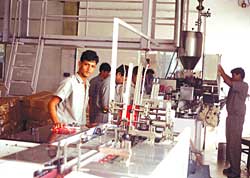 Sooner or later political turmoil had to impact industrial production, and it now finally has.
Sooner or later political turmoil had to impact industrial production, and it now finally has. We are making less of everything from needles to noodles. Official neglect and indifference is forcing factories to close down and lay off workers. The five-day Maoist strike next month may be the final blow for many.
There has been no mass-closure yet, but industrialists say many factories in tarai towns are working only three or four days a week and cutting back on production. Overall manufacturing has declined by between 30-50 percent, depending on the commodity. Beer and alcohol, already hit hard by the Maoists' dry drive last year, are still stagnant. Even the production of instant noodles and toothpaste is down. Growth in the past six months is estimated to be about 10 percent negative.
"There is a net decline in almost every sector," says Yubaraj Khatiwoda, an economist at the Research Division at Nepal Rastra Bank who keeps track of economic performance. "Even if we had peace today, it would take another six months for the quickest turnaround."
But this hinges on the assumption that there will be a spurt in export demand resulting from, say, new concessions for Nepali garments in the US market. It could take much longer for new investment decisions .
With no silver lining, business is in deep gloom. Most Nepali industrialists we talked to are so fed up they don't want to discuss the slump anymore. Those that do, repeat an uncannily similar story irrespective of the commodity they manufacture. "Our market territories are getting out of reach, payments are becoming a big problem, banking channels are disrupted, and people don't feel safe to hold cash or stocks," says industrialist Binod Chaudhary.
. Garment exports are down by a third
. Carpets are at a quarter of normal levels
. Pashmina has fallen by 80 %
. Food and beverages are down 30-50 %
. Liquor sales are down by 60 %
. Textiles are flat and could slip further
Factories that earlier thought protecting production by re-scheduling shifts would help them tide over the emergency are now beginning to realise there is no point producing unless you can sell. Production at a rice mill in Birgunj has been slashed by 75 percent because it has become almost impossible to send foodgrains to remote mountain districts-the major markets. The situation is also frustrating for many in government. One economist told us he dreads looking at the new statistics that arrive on his desk every month. The numbers are all tumbling.
"The best-case scenario for manufacturing this year is zero growth," the government economist told us. "It means we can write off even the little employment that was being generated until last year." Industry employs about 300,000 people and once layoffs accelerate, contract workers will be the first to be hit.
Last year manufacturing contributed Rs 38.7 billion to Nepal's GDP, when the economy was relatively buoyant and exports were bullish. Today, even though the trade treaty with India has been renewed, it is unlikely there will be a major increase in exports. This is because the five products (zinc oxide, copper wire, steel pipes acrylic yarn and vanaspati ghiu) that now face quantitative restrictions for duty-free access used to account for almost 40 percent of exports to India. "We don't know who to blame anymore," a producer and exporter of toiletries told us. "Even now, no one is seriously considering a holding-on strategy either at the shop-floor or in policy circles."
Recession in domestic demand, resulting from factors like low agricultural growth and the security situation, has hit the entire chain from manufacturers to distributors to retailers.
Purchasing power has fallen, buyers are spending cautiously, so traders and retailers don't have money to hold stocks, which translates into a slump in factory sales. The problem is more severe in markets feeding the hinterland, where restrictions on movement have sapped demand.
Supplies are unpredictable because of security checks along the major highways. In some districts, security forces, in an attempt to cut off Maoist food supplies, have even blocked transport of food products.
"Security is better than being killed by Maoists but the measures taken by government are killing industry," says an alcohol producer. Shops shut down early and alcohol dispensation has come to almost a complete halt. "Suddenly our industry has become unviable."
Economist Shankar Sharma has a bird's eye view of the economy from his perch above the prime minister's annex in Singha Darbar. He says the external situation is already showing signs of improvement and, assuming our domestic problems are resolved in six months, we can look forward to 5-6 percent economic growth. "But," he adds, "these predictions depend on peace."


